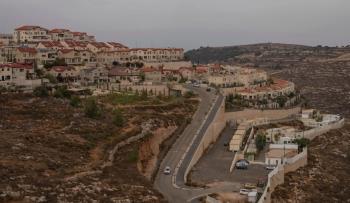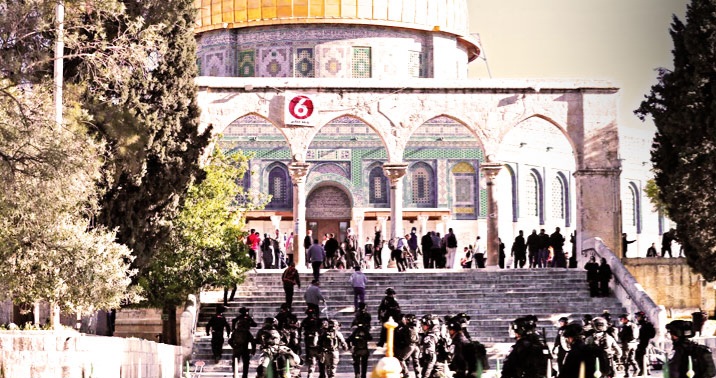Alwaght- The recent wave of Israeli police violence in the holy Al-Aqsa Mosque has strained the already tense relations between the Israeli regime and Jordan that is the ”official custodian” of Muslim and Christian holy sites in Al-Quds (Jerusalem). In addition, in recent weeks, Israeli settlers have been storming Al-Aqsa Mosque with backing from regular military forces. Images published on social media show that the Israeli police use batons, tear gas, smoke grenades, and plastic bullets against Palestinians. Over the past three weeks, at least 450 Palestinians have been arrested and at least 31 people have been injured.
Tensions in the mosque even led to retaliatory missile attacks on Israeli cities from Gaza and Lebanon by Palestinian resistance groups, raising the tensions to a point that many regional countries, including Jordan, condemned the Israeli forces’ violence in the holy site.
Amman, which officially normalized its diplomatic relations with Tel Aviv in 1994, in its recent statement held Tel Aviv fully responsible for the escalation of tensions in Al-Quds and all other occupied Palestinian territories. This escalation comes as the actions of the far-right Israeli cabinet, headed by Benjamin Netanyahu, have already negatively affected relations with Jordan. Some members and ministers of Netanyahu’s cabinet even make statements about the formation of ‘Greater Israel’, which in practice means ignoring the sovereignty and complete occupation of Jordan.
Cold peace
In addition, in the Jordanian civil society, working relations with the Israeli regime are severely abhorrent. According to a 2021 poll, 80 percent of the Jordanians said that liberation of the Palestinian territories are a priority and vital to them. Also, it should be taken into account that Palestinians account for 60 percent of the Jordan’s population. They were displaced and migrated to Jordan after 1948 and 1967 wars. After the Al-Aqsa raids by Jews, thousands of demonstrators gathered in Amman in front of a mosque near the Israeli embassy and called on the government to expel the Israeli ambassador. Some Jordanian officials have made a request allowing Jordanian citizens to go to the West Bank to help Palestinians against the Israeli violence.
This request suggests that Jordanians think that the reactions of their government to the Israeli actions are inadequate.
Polls suggest that public trust in the Jordanian government, particularly the Council of Ministers, has declined significantly since the 2011 Arab uprisings. Research data from the Arab Barometer Network say that only 43.3 percent of Jordanians expressed confidence in their government in 2020, a decrease of about 70 percent compared to 2011.
It should be taken into consideration that Jordan’s peace with Israel is defined as a ‘cold peace’ because it is restricted to the security institutions and the civil society rejects it.
“Jordan’s peace with Israel is often framed as a ‘cold peace’ because it has been limited to the government as well as the security establishment; it has not included civil society or the people,” said Merissa Khurma, director of the Middle East program at the Wilson Center, a policy forum on global affairs.
“Now, the actions of Israel’s right-wing government are becoming fodder for longstanding opposition to the normalization of diplomatic relations.... So far, the uproar seems highly unlikely to upend a relationship with Israel that the Jordanian government views as necessary to its security, and which enables its close alliance with the US, and now it is unlikely the Jordanian government can persuade the public opinion about relations with Israeli government as the hardliners in Tel Aviv are holding plans for full occupation of the West Bank and even parts of Jordan,” Khurma continued.
Amman’s 1994 peace treaty with Tel Aviv was signed during the “Oslo era,” when the peace process between Israel and the Palestine Liberation Organization (PLO) was ongoing, and headway toward a two-state solution seemed possible. In addition to ending the state of war between the two sides, the treaty established cooperation on matters of trade and tourism, and settled disputes over natural resources; perhaps most importantly from the Jordanian perspective, it enabled Jordan to buy much-needed water from the Israeli regime, but it failed to ease the public opposition to Israel.
The treaty also opened the floodgates of US economic and military assistance to Jordan, but the Jordan’s popular antipathy to the Israeli occupation remains high. Since over the past three decades the two-state solution for Palestine dispute has failed and more than that occupation in the West Bank expanded. This gives Jordan’s civil society every reason to strongly reject any peace with Tel Aviv and find it of no avail.
Last year, a poll showed that 94 percent of Jordanians opposed diplomatic recognition of Israel by their country, according to the Jewish Currents website. Opposition to peace with Israel is partly because of continuation of the occupation.
Hot tensions
Despite the cold peace between the Israeli regime and Jordan, their tensions are at their highest level. Jordan’s foreign ministry stated on Sunday that a Jordanian member of parliament was detained by Israeli forces on the suspicion of smuggling weapons and gold to the West Bank. According to the ministry, Imad Adwan, a 35-year-old lawmaker, is in custody for questioning about the so-called smuggling. This member of parliament is a member of Palestine Committee at the parliament and a lawyer.
Israeli media reported that Adwan was arrested in an Israeli-run border crossing between Jordan and the West Bank.
Also, Kan, the Israeli official broadcaster, in a Twitter post said that due to the tensions caused by detention of the Jordanian member of parliament, Jordan’s Foreign Minister Ayman al-Safdi declined a phone call by his Israeli counterpart Eli Cohen.
Political sources in Amman maintained that if the Israelis continue their violations, Jordan will mull recalling its ambassador and expelling Israeli ambassador. The same sources said that concerning custodianship of the holy sites in Al-Quds, Jordan will remain on its status within the framework of the 2016 protocols. If the Israeli violations continue, the government will possibly implement the parliament demand for expelling Israeli ambassador, the sources said, adding that Jordan’s foreign ministry will likely recall its ambassador from Tel Aviv before the far-right figures in the Israeli government finalize Al-Quds case.
It seems that Jordanian government is well aware of the degree of the public discontentment with peace with Tel Aviv. Therefore, escalating tensions have given its officials the opportunity to take stricter stances against the Israeli occupation in response to civil society’s demands.



























